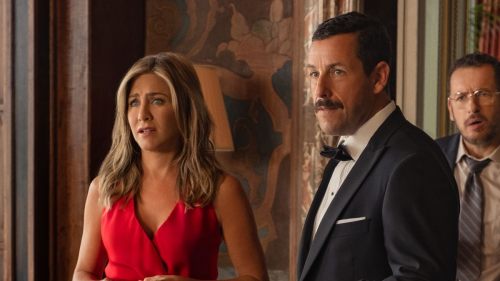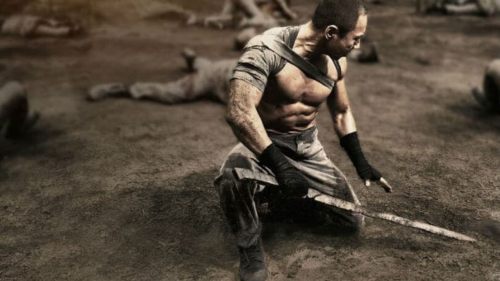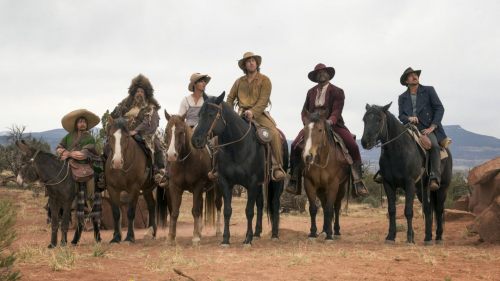On THE BALLAD OF BUSTER SCRUGGS’ Most Elegant And Depressing Chapter
The Ballad of Buster Scruggs has been out on Netflix long enough that anyone who’s anyone has seen it. If you haven’t, you’re either not "anyone," or you simply can’t keep up with the pace of Netflix's original programming. It’s okay. There’s a lot, and the pressure for us to keep watching is as real as the reasons we often can’t. We’ve all been there.
That’s part of why my favourite segment of the Coen Brothers’ Wild-West Twilight Zone anthology is what it is. Many people seem gravitate towards the dark comedy of the film’s opening two segments, or the bucolic prospecting odyssey of “All Gold Canyon,” or the more fleshed-out narrative of “The Girl Who Got Rattled.” But I, sucker for punishment that I am, prefer the film’s arguably most depressing segment, “Meal Ticket.”
In “Meal Ticket,” an impresario (Liam Neeson) travels the West with a quadruple amputee dramatic artist (Harry Potter’s Harry Melling), who makes up for his lack of limbs with his oratory skill. The artist delivers monologues to rapt audiences, and the impresario collects payment afterwards. It seems to work out pretty well. But despite continuing mellifluous performances, audiences dwindle, instead opting to watch “performances” by a man with a chicken that, supposedly, can do rudimentary mathematics. Seeking to bolster his fortunes, the impresario buys the chicken, at which point the artist suspects he’s done for - which he is, when it's strongly implied Neeson’s character tosses him in a river to drown.
From a storytelling perspective, "Meal Ticket" is the simplest, tightest, and most darkly poignant short in the bunch. There’s no fat on its bones: it’s told almost entirely visually, to the point that it’d play just as well without any sound at all. Neither main character says much with their words - hell, they aren’t even given names. Neeson’s character barely speaks, while Melling’s repeats his monologues to the point that they lose any sense of meaning (other than sly juxtapositions of text and subtext). Yet both actors speak volumes with their faces, subtly revealing every inner thought whether in silence or mid-performance.
Unsurprisingly, the short becomes more fascinating when you consider the environment in which it was made and released.
"Meal Ticket"'s theme is simple enough that the specifics almost don’t matter - who hasn’t experienced being tossed aside in favour of the next big thing, in some fashion? - and the specific metaphor will read differently to every viewer. But given that the story's based in the Wild West equivalent of the Coens' milieu, there’s tantalising drama to be read into it.
On one hand, “Meal Ticket” could be read as a treatise against the hyperactive, instant-gratification entertainment culture in 2018. The Coens have always bucked convention in one way or another: their dramas are often slow and oblique, while their comedies vacillate between farcical and pitch-dark. The term “Coenesque” wouldn’t exist if the brothers hewed to common storytelling practice. This short's "artist," his monologues reflecting both the ornate weightiness of the Coens' words and their intentionally-mannered delivery, could be seen as the Coens struggling to maintain relevance in an increasingly franchise- and blockbuster-driven industry. After all, who wants to watch a guy literally just sit there and tell stories when they could watch a fucking chicken do math - or a robot smash a building? Empty calories, to be sure, but just look at it! It's a chicken that does math!
The short can also be read as a more focused screed against Netflix itself, the Coens subtly pecking at the hand that feeds. Netflix’s model encourages viewers to constantly move from one film or episode to another, through both episode structure and the Netflix UI, which not only directs you to the next title, but also skips the credits, avoiding any potential break in your entertainment. When engaging in the intended Netflix viewing behaviour, you’re not even given the chance to applaud for the silver-tongued amputee before the service is beating you over the head with a mathematically-skilled chicken. As the chicken performs trick after trick, to the approval of the braying crowd, so too does Netflix constantly prod viewers to watch one more episode, watch whatever’s next on their algorithmically-generated queues.
That reading, however, could simply be an accident of Scruggs ending up where it did. “Meal Ticket” existed in outline form as far back as 2002, well before even YouTube came into existence, and the Coens have given Netflix credit for backing the kinds of low- to mid-budget films studios simply don’t anymore. And that’s true: it’s hard to see a major studio funding Scruggs, or Roma, or any number of titles Netflix has released over the past few years, when megablockbusters are a stronger investment. Maybe Netflix is an unseen good Samaritan, waiting at the bottom of that river canyon, waiting to catch the artist before he drowns. I mean, we never saw a body.
Still, though, the thought is tantalising. Not counting the Fargo TV series (on which they're nominally credited), Scruggs is the first project the Coens have ever made for a non-theatrical platform, and the first film they ever shot digitally. It represents the pair taking a step into a new entertainment world, with new paradigms and new established practices. “Meal Ticket” feels so strongly like a response to that changing world that it’s hard not to draw comparisons between its characters and the major players in it.
Whether it’s about Netflix, or the franchise-movie glut, or the Coens’ as-yet unseen hatred for intelligent domestic fowl, it’s a short that feels saturated with meaning and reserved emotion. Given its restrained style, it’s the equivalent of a cry of despair muffled through a pillow, and regardless of what it’s criticising, its voice is loud, its tone desperate, and its outlook exceptionally bleak. Maybe that, more than any particular reading, is why I like it so dang much.
Feel free to play out your own Buster Scruggs personality test in the comments below.



